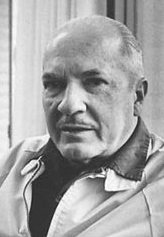
Robert Anson Heinlein (1907-1988) was an American science fiction author, aeronautical engineer and naval officer. Sometimes called the "dean of science fiction writers"1, he was among the first to emphasize scientific accuracy in his fiction, and was thus a pioneer of the subgenre of hard science fiction. His published works, both fiction and non-fiction, express admiration for competence and emphasize the value of critical thinking2. His plots often posed provocative situations which challenged conventional social mores3. His work continues to have an influence on the science fiction genre and on modern culture more generally.
Heinlein became one of the first American science-fiction writers to break into mainstream magazines such as The Saturday Evening Post in the late 1940s. He was one of the best-selling science-fiction novelists for many decades, and he, Isaac Asimov and Arthur C. Clarke are often considered the "Big Three" of English-language science fiction authors4. Notable Heinlein works include Stranger in a Strange Land, Starship Troopers (which helped mold the space marine and mecha archetypes) and The Moon Is a Harsh Mistress. His work sometimes had controversial aspects, such as plural marriage in The Moon Is a Harsh Mistress, militarism in Starship Troopers and technologically competent women characters who were formidable5, yet often stereotypically feminine—such as Friday.
Heinlein used his science fiction as a way to explore provocative social and political ideas and to speculate how progress in science and engineering might shape the future of politics, race, religion and sex. Within the framework of his science-fiction stories, Heinlein repeatedly addressed certain social themes: the importance of individual liberty and self-reliance, the nature of sexual relationships, the obligation individuals owe to their societies, the influence of organized religion on culture and government, and the tendency of society to repress nonconformist thought. He also speculated on the influence of space travel on human cultural practices.
Heinlein was named the first Science Fiction Writers Grand Master in 19746. Four of his novels won Hugo Awards. In addition, fifty years after publication, seven of his works were awarded "Retro Hugos"—awards given retrospectively for works that were published before the Hugo Awards came into existence7. In his fiction, Heinlein coined terms that have become part of the English language, including grok, waldo and speculative fiction, as well as popularizing existing terms like "TANSTAAFL", "pay it forward", and "space marine". He also anticipated mechanical computer-aided design with "Drafting Dan" and described a modern version of a waterbed in his novel Beyond This Horizon.[16]
-
M. Keith Booker and Anne-Marie Thomas, The Science Fiction Handbook, Wiley-Blackwell, Chichester, UK: 2009, p. 155. ↩︎
-
Farah Mendlesohn, The Pleasant Profession of Robert A. Heinlein, Unbound, London: 2019. ↩︎
-
Sam Jordison, "Robert Heinlein's softer side", The Guardian, 12 January 2009, accessed 21 May 2024. ↩︎
-
Patrick Parrinder, Learning from Other Worlds: Estrangement, Cognition, and the Politics of Science Fiction and Utopia, Durham: Duke University Press, 2001, p. 81. ↩︎
-
M. G. Lord, "Heinlein's Female Troubles", The New York Times, 2 October 2005, accessed 22 May 2024. ↩︎
-
"Robert A. Heinlein: Named a Grand Master in 1974", Nebula Awards, SFWA.org, accessed 23 May 2024. ↩︎
-
"Robert A. Heinlein Awards", Science Fiction Awards Database, SFADb.com, accessed 23 May 2024. ↩︎
This article is derived from the English Wikipedia article "Robert A. Heinlein" as of 10 May 2024, which is released under the Creative Commons Attribution-Share-Alike License 3.0.
